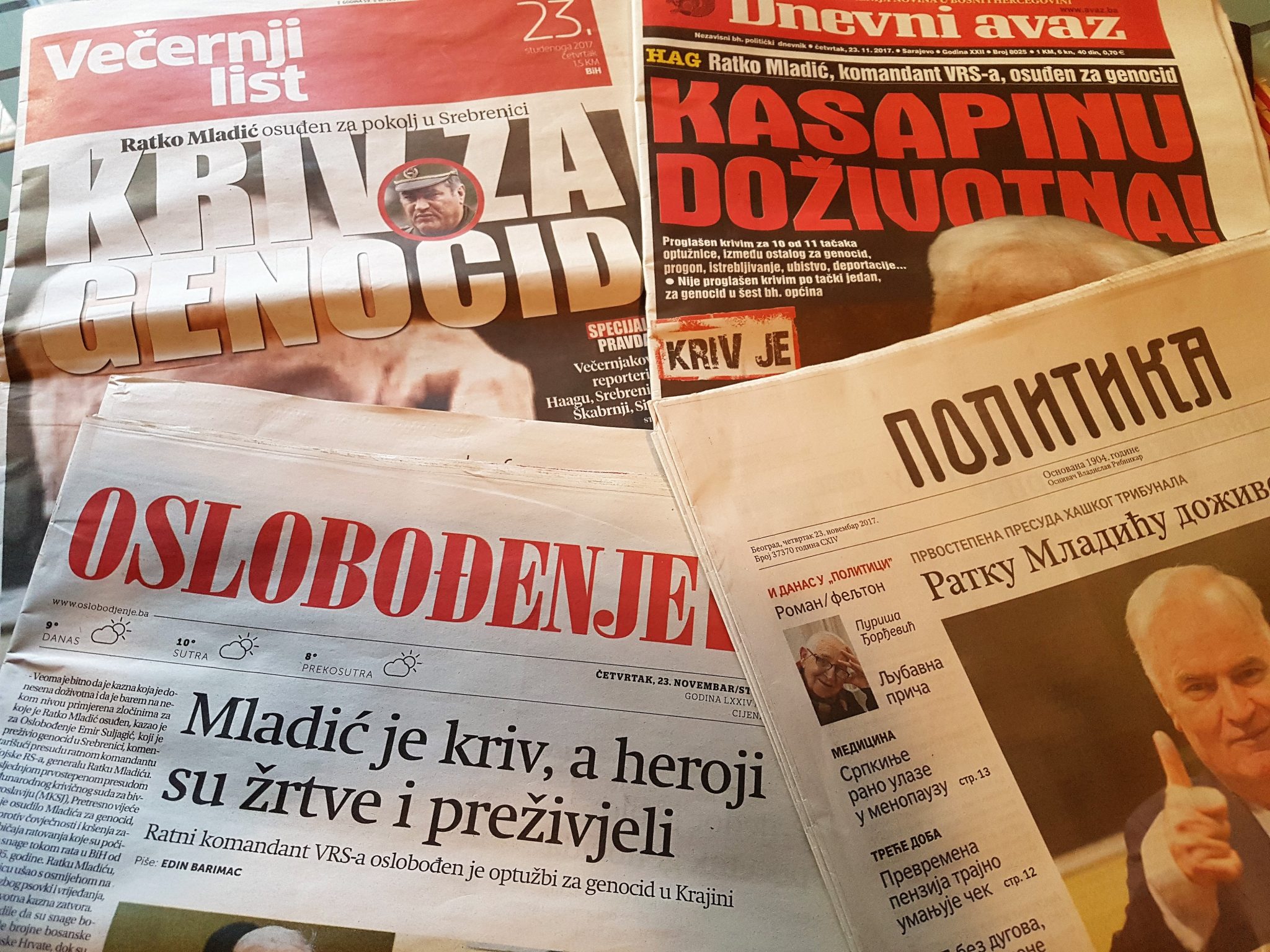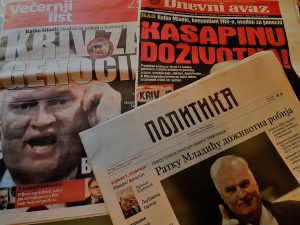by Tajma Kapic, doctoral candidate at IICRR & Irish Research Council of Government Scholar
On the 22nd of November 2017, after 530 trial days during which they heard from almost 600 witnesses and examining more than 10,000 exhibits concerning 106 crimes, the Judges of the International Criminal Tribunal for the Former Yugoslavia in The Hague (commonly known as the ICTY), sentenced Ratko Mladić, a general in the paramilitary formations of the Republika Srpska, to life in prison. Mladic, also known as the ‘butcher of Bosnia’, was sent to prison 22 years after directly taking part in a genocide against Bosnian Muslims (Bosniaks), ordering the killing of almost 8,500 men and boys in the town of Srebrenica, during the war in Bosnia and Herzegovina.
The prosecutors in the ICTY, arguably one of the most important war crimes tribunals since the Nuremberg trials which took place following WWII, charged Mladić on 11 counts of crimes, including two of genocide, five of crimes against humanity, and four of violations of the laws or customs of war. He was also charged with the 1425 day-long siege of Sarajevo, the longest siege of a capital city in modern warfare. Mladić was found guilty of ten of these charges. The charge of which he was not found guilty concerned six municipalities of Bosnia and Herzegovina where mass killings, systematic rapes and ethnic cleansing conducted by Serb forces took place at the beginning of the war, in 1992. While reading the verdict before passing the sentence, Judge Alphons Orie described Mladić’s war crimes as “the most heinous known to humankind and include genocide and extermination”.
Coincidentally, the sentencing of Ratko Mladić took place the day after the 22nd anniversary of the initial signing of the Dayton Peace Agreement. This is the peace agreement that brought Bosnia and Herzegovina into a fragile state of peace but, more importantly, which divided the country along the ethnic lines into two entities: The Federation of Bosnia and Herzegovina (51% of the territory) and The Republika Srpska (49% of the territory). By the time the peace agreement was reached, Republika Srpska was almost completely free from any non-Serb inhabitants, which was a result of more than three years of ethnic cleansing conducted by the Serb paramilitary under the command of Ratko Mladić.
Unsurprisingly, most of the foreign media, and members of the international community in Bosnia and Herzegovina and abroad, commented that the passing of the highest possible sentence to Ratko Mladić was a ‘warning message to every perpetrator of war crimes that they will not escape justice, no matter how powerful they may be, nor how long it may take’. This message, however, was not taken up by the local media in Bosnia and Herzegovina and even less so by the country’s political elite. Here, as with most things political or otherwise, media reporting and statements by the high-ranking politicians are split up along ethnic lines. While Bosniaks considered this sentence as a ‘consolation to the victims of these crimes and the smallest satisfaction for the genocide committed against their nation’, Serb-led media hailed him as a hero. The President of The Republika Srpska, Milorad Dodik, stated: ‘Mladić has, a long time ago, earned a hero’s place in the history of Serbian people’.
The sentencing of former general Mladić marks the end of the long and thorny road to justice for many war criminals and especially their victims, but also the end of the ICTY. According to many commentators, the closing of the ICTY marks the end of an era. The Tribunal is to cease its activities at the end of November, after the long-awaited second instance verdict for the war leadership of Croatian para-state Herzeg-Bosnia in the case ‘Prlić et al.’ During the Trial Chamber judgment, these defendants were sentenced collectively to 111 years in prison for ethnic cleansing and war crimes committed against Bosniaks in the Herzegovina and central Bosnia region, during the formation of the para-state of Croatian Republic Herzeg-Bosnia. The ethnic cleavages ‘frozen’ by the consociational peace agreements in Bosnia and Herzegovina were evident even inside the entity of the Federation of Bosnia and Herzegovina. The Federation was created by the Washington Peace Agreement signed in 1994, between the leaders of Bosnian Croats and Bosnian Muslims. This act, on paper at least, marked the end of the Croatian para-state of Herzeg-Bosnia. In practice, however, and in the minds of the Croatian nationalists, the idea of Herzeg-Bosnia is still very much alive. This is evident even in the fact that Bosnian Croat leaders were unavailable for comment on the sentencing of Ratko Mladić, even though thousands of Croats perished in the Serb-held concentration camps, or were banished from their homes during the ethnic cleansing of the territory of Republika Srpska. One cannot but feel that Bosnian Croat leadership are holding out on passing any comments on the ICTY until the sentencing of their own war leaders for war crimes that they committed, which is expected at the end of November.
While ethno-nationalist political elites are scoring political points by playing ping-pong with their war rhetoric, for the past 22 years the the citizens of this troubled country have been living in a constant state of political crisis. The people of Bosnia and Herzegovina are forced to hum their national anthem because their leaders cannot agree on the lyrics, and there is not even one common public holiday celebrated on the territory of the country as a whole. Besides, there is a common opinion here that very soon, political leaders will have no one to ‘lead’ because, as a result of the mass exodus of young people who see no future here, Bosnia and Herzegovina is becoming a country of old people stuck in the war-ridden past.





